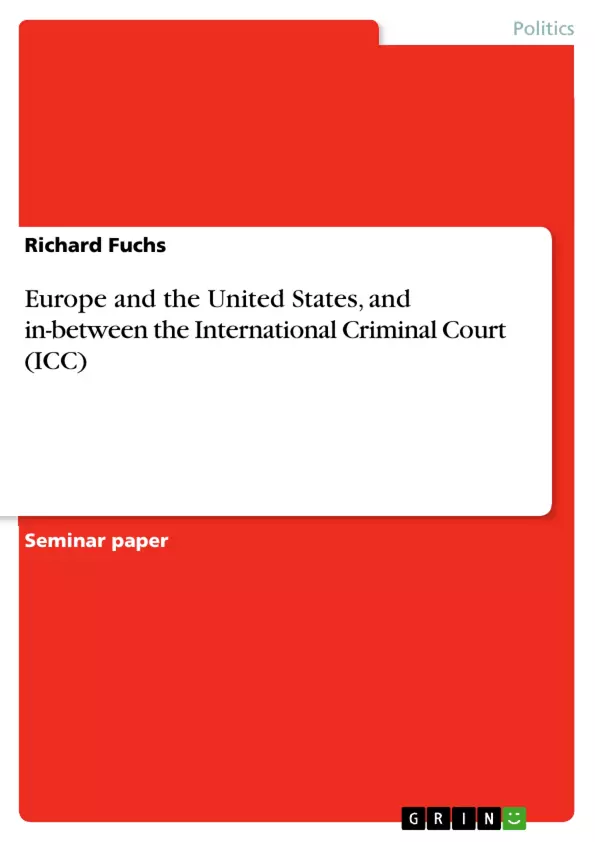[...] The paper attempts to make this transatlantic conflict more transparent through a comparative analysis of U.S. and EU responses to the ICC. It provides historical knowledge about the ICC development from an unsettled idea to its final implementation, and it clarifies American and European National Interests behind the scenes. Within the analysis, American objections will be outlined and set in context with the European counter-arguments. The most controversial issues between the transatlantic partners including the prosecutorial powers, the question of immunity, the risk of politically motivated prosecutions as well as the rights of the accused in trial procedures will be at the heart of the debate.
The paper works with the hypothesis that the ICC case constitutes a transatlantic clash of ideologies centering on a fundamentally different interpretation of national sovereignty. Whereas the European Union considers the ICC as an expansion of its national sovereignty and its sphere of influence, the U.S. views the same issue as an infringement of its Constitutional Rights (Macpherson & Kaufman, 2002, p. 220). Whereas the EU is in fear of a possible ‘double standard’ in International Human Rights Law, the U.S opposes ‘automatism’ in ICC jurisdiction as a result of its universality. For the EU, a ‘double standard’ in International Human Rights Law would occur, if American citizen were granted immunity without specification of time and conditions. For the US, the rejected ‘automatism’ is the Court’s right to step in and take over a case under ICC jurisdiction if a trial is not preceded after the Rome Statute ‘Rules of Procedure’. For the purpose of our research, the paper will start with the definition of State Sovereignty of Langley, which defines the multifaceted term as “a fundamental concept of international law, defining the supreme authority of each state to make and enforce laws with respect to all property, events, institutions and persons within its borders” (Langley, 1999).
I conclude that that we indeed can see in the ICC case study urgent evidence for an ideological gap between the EU and the US, because the main arguments on both sides can all be traced back to the underlying question, how national sovereignty is defined under the current Rome Statute, so that we have to redefine the above mentioned definition for the US, respectively for the EU.
Inhaltsverzeichnis (Table of Contents)
- Introduction
- Discussion
- The ICC controversy – Latest Developments
- The History of the Dispute - From The Hague to Rome
- One Treaty, Different Views - The ‘Rome Statute'
- Comparative Analysis of the different views on the ICC
- Conclusion An ideological gap to bridge?...
Zielsetzung und Themenschwerpunkte (Objectives and Key Themes)
This paper aims to analyze the transatlantic conflict surrounding the International Criminal Court (ICC), highlighting the ideological differences between the United States and the European Union regarding national sovereignty and the ICC's jurisdiction. It explores the historical context of the ICC's creation, the American and European positions on the issue, and the controversial aspects of the ICC's structure and functioning.
- Transatlantic conflict over the ICC
- National sovereignty and international justice
- Ideological differences in the interpretation of international law
- The role of the ICC in international relations
- Comparative analysis of U.S. and EU perspectives on the ICC
Zusammenfassung der Kapitel (Chapter Summaries)
The introduction outlines the background of the ICC's creation, emphasizing the ongoing dispute between the US and the EU regarding its jurisdiction. The chapter discusses the history of the ICC, from its initial conceptualization to its final implementation. It highlights the significant differences in national interests that fuel the transatlantic conflict.
The second chapter delves deeper into the ICC controversy. It examines the latest developments, highlighting the American withdrawal from the Rome Statute and its consequences. The chapter explores the historical origins of the dispute, tracing its development from The Hague to Rome. It analyzes the contrasting interpretations of the Rome Statute by the US and the EU.
Schlüsselwörter (Keywords)
Key terms and concepts explored in this paper include: International Criminal Court (ICC), Rome Statute, transatlantic conflict, national sovereignty, international law, international justice, American exceptionalism, European Union, ideological gap, human rights, war crimes, crimes against humanity, genocide, prosecutorial powers, immunity, politically motivated prosecutions, rights of the accused.
Frequently Asked Questions
What is the main cause of the dispute between the US and EU regarding the ICC?
The conflict centers on fundamentally different interpretations of national sovereignty and the jurisdiction of international law.
How does the US view the International Criminal Court?
The US views the ICC as an infringement on its Constitutional Rights and opposes the "automatism" of its jurisdiction over non-member states.
What is the EU's stance on the ICC?
The EU considers the ICC an expansion of national sovereignty and a necessary tool to prevent "double standards" in human rights law.
What are the most controversial issues in the Rome Statute?
Key issues include prosecutorial powers, immunity for citizens, risk of politically motivated trials, and the rights of the accused.
How is state sovereignty defined in this context?
It is defined as the supreme authority of a state to enforce laws within its borders, a concept that is challenged by the ICC’s universal reach.
- Quote paper
- Richard Fuchs (Author), 2003, Europe and the United States, and in-between the International Criminal Court (ICC), Munich, GRIN Verlag, https://www.grin.com/document/11832



